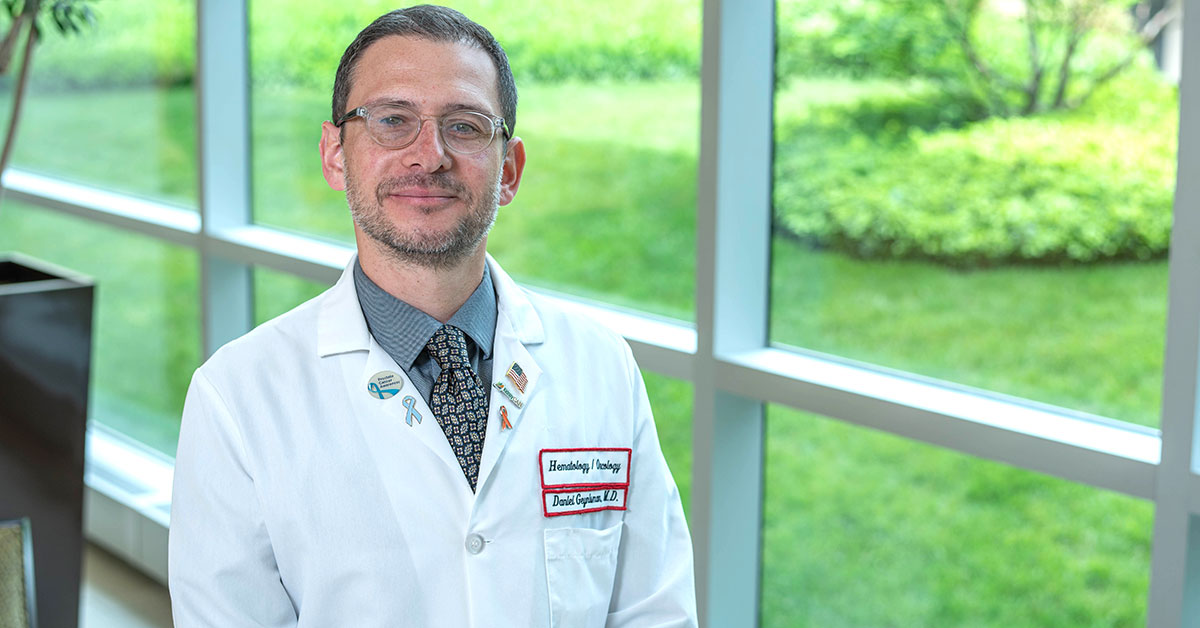
PHILADELPHIA (February 15, 2023)—Half of the experimental group of muscle-invasive bladder cancer patients successfully kept their bladders and reached the two-year endpoint of the RETAIN BLADDER phase II clinical trial without developing metastatic cancer, according to final results presented today by Fox Chase Cancer Center researchers at the 2023 American Society of Clinical Oncology Genitourinary Cancers Symposium in San Francisco.
Although the researchers just missed meeting their overall benchmark for two-year metastasis-free survival in the entire group of patients, the results will inform the subsequent RETAIN BLADDER II and III trials, said Daniel M. Geynisman, MD, associate professor in the Department of Hematology/Oncology at Fox Chase, who headed the study.
“Whether it’s in the next trial or the trial after that, we’re continuously trying to, in an iterative process, improve upon the way we’re treating patients, preserve quality of life, and provide some options for organ preservation,” said Geynisman.
The intent behind RETAIN BLADDER was to identify whether certain muscle-invasive urothelial carcinoma patients could ultimately keep their bladder. Currently, standard of care is to treat these patients with chemotherapy and surgically remove their bladder. However, for some patients, the chemotherapy successfully wipes out the cancer, in which case they shouldn’t need a subsequent cystectomy, a surgery to remove the bladder.
The researchers compared results for 26 muscle-invasive urothelial carcinoma patients who showed no evidence of cancer following chemotherapy and were spared a cystectomy (the active surveillance group) and 45 patients who received standard of care (the control group). The endpoint for the trial was metastasis-free survival after two years.
“Whether patients have surgery or don’t have surgery to remove their bladder, you expect a certain proportion of patients to unfortunately develop metastatic disease,” said Geynisman. “The question was, if we do this approach where we allow some people not to go on to surgery, will we be doing at least as good in regards to this very important endpoint of metastatic disease? Because if we are, then we’ve saved some people a big surgery, they have their bladder, and that by itself is a win.”
After two years, almost half (46%) of the 26 patients in the active surveillance group had survived without developing metastatic disease and retained their bladders with no radiation either. However, 10 out of 26 (38%) active surveillance patients developed metastatic disease, a statistically similar proportion as was seen in the control group, where 14 out of 45 patients (31%) developed metastasis (p=0.6). The two-year metastasis-free survival was also statistically similar between the two groups, 77% in the active surveillance patients and 67% in the remaining patients (P=0.82).
“Our question as we look at these data is this: Would earlier cystectomy have cured the 10 patients in the observation cohort who later developed metastatic disease, and if so, how can we better find out who they are to route them to earlier surgery while sparing cystectomy for those who can safely keep their native bladders,” said Elizabeth Plimack, MD, MS, a professor in the Department of Hematology/Oncology at Fox Chase and a study co-author.
These results will inform how Geynisman and his fellow researchers move forward with subsequent trials. One thing they learned was that when active surveillance participants developed recurrent localized disease in their bladder, it was a good indicator that it was time to remove the bladder rather than continuing with local therapies. Of the 10 active surveillance patients who developed metastatic disease, 90% recurred with localized disease first.
“You can imagine patients who went on this trial and who got to go on surveillance were really excited and committed to not having their bladder removed, as were their physicians. I think we need to be very mindful of this as we counsel patients in ongoing and future trials of this approach,” said Geynisman.
In the next iteration, RETAIN BLADDER II, muscle-invasive bladder cancer patients will receive an initial combination of chemotherapy and immunotherapy, instead of chemotherapy alone. The researchers will be looking to see whether this combination better eradicates the cancer and improves two-year metastasis-free survival in patients who retain their bladder.